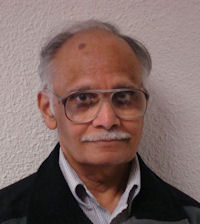 |
STAGES PER STUDENTI DI SCUOLA SECONDARIA STAGES INVERNALI 2009 |
 |
 |
A.P. BALACHANDRAN
|
I was born in the state of Kerala in India. My education up to the doctoral degree was entirely in India. I got my Ph.D. from the University of Madras. Then I went to the University of Vienna to work with Professor Thirring in 1962. I participated in the first Trieste meeting organised by Prof. Abdus Salam. From Vienna I went to the University of Chicago as a post-doctoral fellow and finally joined the faculty of Syracuse University in 1964. I am now the Joel Dorman Steele Professor of Physics there. I have worked in many countries since joining Syracuse. In particular, my connections to India and the institutions there have been very strong. Q: How and why did you decide to study physics and which is the best memory of your life as a student? As a student in India, I wanted to do pure mathematics. But jobs in that field were scarce. So when an opportunity opened up for doing theoretical physics, I persuaded my parents to let me take it, with the understanding that after I got Masters in that subject, I will write the Indian Administrative Service exams. We thought that physics was a better preparation for that. Actually I never did write that exam and continued on as a student. My best years were in high school and college when I found that I could solve difficult problems in physics and mathematics by hard thought. I found then that I enjoyed thinking. Q: Which difficulties did you have to face and what was the most exciting episode of your career? There were difficuties in early years when as a result of Britsh colonialism, there were few jobs in science in India, and that made choosing an academic career very risky. The single most exciting episode was when I learnt the so-called Gauge principle. I was amazed by it. Now of course it permeates all of fundamental physics. Q: What are you working at presently? I am now working with colleagues on the nature of spacetime at very short (10^{-32} cms} distances and its effects on what is called Pauli principle which is the basis of much of chemistry and other basic principles. Q: Which do you believe will be the next discovery in physics? I do not know what would be the most important discover in physics. It could be the identification of 'dark matter' which permeates space, but which cannot directly seen (it does not radiate and hence is dark). Q: In your opinion, which is the best discovery ever and who is your favorite scientist? Certainly the most important discovery ever was Newton's law of gravitation. In our times, I have been most impressed by the work of Dirac for its fanatsy and originality. Q: How important is the collaboration in scientific research, especially among researchers from different countries? Collaboration in scientific research is very important. Deep ideas are often generated in that manner. For rapid progress, it is equally important to disseminate knowledge widely and have collaboration between different countries. It also encourages solidarity between at least scientists in different countries. Q: How can a scientist be defined and how do talent, intuition and study influence his profession? I suppose a scientist is one with a strong engagement with reality and interest in understanding it in materialist terms. The process of scientific discovery and in fact of all creativity complex. All the factors above play a role. There is an excellent article by the great mathematician Poincaré on how he discovered a deep result. It is very instructive. Q: What are your hobbies and passions and what book would you suggest us to read? I like Indian Carnatic music and literature in many languages. There are many excellent popular books by authors like Brian Green, Stephen Hawking and Steve Weinberg. I would suggest a young person to browse through them and read those which can be understood. Q: How do you see the future of research in this period of global economic crisis? No idea. I don't even know what the world will be like when it is all over. |